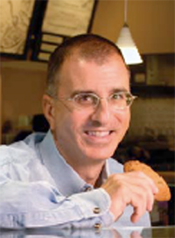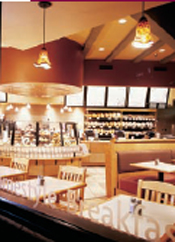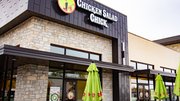News
Q&A with Louis Basile
Owner, Wildflower Bread Company, president, Fast Casual Executive Alliance.
October 6, 2008
This article orginally published in Fast Casual magazine, October/November 2008.
 Louis Basile got his start in the bakery/café segment in 1981, taking a position at Boston-based Au Bon Pain when the chain boasted only three units. He spent most of his career there — nearly 14 years — as vice president of operations and then as VP of menu development.
Louis Basile got his start in the bakery/café segment in 1981, taking a position at Boston-based Au Bon Pain when the chain boasted only three units. He spent most of his career there — nearly 14 years — as vice president of operations and then as VP of menu development.At the time, the term fast casual had yet been coined, but Basile had become part of a segment he is now helping to build.
In 1996, he opened Scottsdale, Ariz.-based Wildflower Bread Company and in 2008, became president of the Fast Casual Executive Alliance. We recently had the opportunity to speak with Basile about his involvement in the fast casual segment and on the role of the Fast Casual Executive Alliance.
– Valerie Killifer
How long have you been involved in the fast casual restaurant industry?
I've been following the progression of that segment throughout my career here (at Wildflower Bread Company). I think it's really just a natural evolution of the choices consumers have made coupled with the entrepreneurship that has really been a hallmark of the restaurant industry. If you include all of retail, clearly the restaurant industry has been the most innovative.
There are trends in other retail segments, but effectively, the restaurant industry really has evolved and has been an integral part of the fabric of our society.
What do you think makes the fast casual segment so unique to the restaurant category?

From the customer perspective I think you can get really high quality food that's value driven delivered in a timely manner.
Those are probably the key components. If you ask consumers what's their attraction to fast casual, the food is really, really good, the value is commensurate with quality and they can get in and out.
From the industry perspective, my guess would be that to get that same quality food typically, you would have to go to casual or fine dining. The square footage is potentially smaller, investment is less, and the number of consumers in the system is greater so you can generate more revenue per square foot. Our sales are some of the strongest in the industry on a square foot basis.
What prompted you to become involved in the Fast Casual Executive Alliance?
Really, it's a funny story. Someone who was working for me had gotten an invitation to the first Summit. To be honest, I wasn't going to go at first. At that point, our company was a little bit bigger and I thought it was time to re-acclimate myself to the industry as whole. When I went to the Summit in Pasadena, I was impressed with the intimacy of the group and I enjoyed the interaction. I really feel at all levels, if you want to make change and be different, be involved.
I think, just like anything else, it requires really good leadership and active participation by its members.
What would you like to accomplish as Alliance president?
I think that clearly I'd like to further the objectives that we set forth for the Alliance.It's my hope that we put a little more structure around the board process. It's raising the awareness if the segment specifically with the National Restaurant Association. And really to hopefully establish the kind of framework so this alliance can move forward and be successful. It's the first of its kind for the fast casual segment.
A group of Alliance members traveled to Washington, D.C., in July. What was the trip's goal and was it successful?
I think that really, our No. 1 goal was to let the National Restaurant Association know the Fast Casual Executive Alliance was out there and we have issues and concerns that we'd like to be addressed at the national restaurant-association level. The second was to say, ‘Hey we want to participate with you folks.'
If you were to give any restaurant industry advice to those just starting out, what would it be?
In this day and age, first and foremost, I think they need to be well capitalized. If anyone has any hopes of succeeding in this business, they need to have enough money to see it through.
It's also about the location. If there's no foot traffic, you're just not going to do well. Really, the economic model, the cost of this business, has changed dramatically and you need to understand that.
 ChatGPT
ChatGPT Grok
Grok Perplexity
Perplexity Claude
Claude












